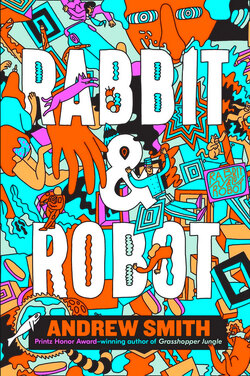Читать книгу Rabbit and Robot - William Hughes, Andrew Smith - Страница 15
Mojave Field
ОглавлениеMeg Hatfield knew more about programming than most of the coders who designed the reasoning architecture in the v.4 cogs that Hinsoft International distributed all over the human world.
“It took me a solid week to figure out the code sequence to get in. Writing you into it was easy. The cogs at the gates scan our eyes and they only see code. They think we’re a couple of v.4s,” Meg said. “Stupid fucking machines.”
“I never went to Grosvenor School a day in my life,” Jeffrie told her. “I came here with Lloyd when I was ten. I could never figure out something like that.”
Jeffrie and her brother Lloyd were burners—arsonists.
“Here” was Antelope Acres—a chain-link-enclosed squatter’s camp in the desert north of Los Angeles.
“You set a mean fire, though,” Meg said.
“Lloyd does, mostly. I just watch.”
Lloyd Cutler had a thing for Meg Hatfield. Meg knew that was why Jeffrie didn’t want her brother to come with them. Besides, Meg didn’t like Lloyd—she didn’t like burners in general, but especially Lloyd, who’d tried to lure her into his camper to have sex ever since she and her father had moved in to Antelope Acres. Meg was afraid Lloyd might get out of control and burn the place down if he came along. So she was relieved that Jeffrie told her not to write him in too, that the girls should go alone.
But Meg liked Jeffrie. Jeffrie Cutler was different from most burners. She didn’t just burn things out of anger. Meg Hatfield knew there was something else Jeffrie was trying to get rid of.
A few days before Christmas, the girls hiked down from Missing Boy Mountain on a trail that led to the highway across from Mojave Field’s glimmering terminal complex. They sat at the edge of the desert and waited for late afternoon, which Meg explained was the busiest time, and the most opportune for the girls to get inside.
“What happens to Lloyd if we don’t come back?” Meg said.
Jeffrie shrugged. “He’s grown up. He can take care of himself.”
“Won’t he worry about you?”
“No.” Jeffrie shook her head. “What about your dad?”
“I’ll call him. He’ll be okay. I’ll come back if he needs me to.”
“Okay.” Jeffrie bit her lower lip and nodded. “What’s it like, writing code?”
“It’s like talking in dog,” Meg said. “It’s an ugly language, because there’s no space for interpretation, which is the difference between cogs and us.”
“I’d rather light stuff up than interpret it,” Jeffrie said.
“No burning here once we’re in. Okay?”
“I promise.” And Jeffrie asked, “Which one of those planes have you been in?”
Across the highway, set a quarter mile behind rows of fencing, sat a rust-smeared and tired old herd of derelict passenger airliners.
“We’re not going in one of those. We’re going inside the place where the big stuff happens,” Meg said.
When it was time, Meg Hatfield drew a rectangle in the air between her thumbs and index fingers. Her thumbphone screen lit up in the space she drew with her hands.
“Are you going to call your dad?” Jeffrie asked.
“No. I’m getting us inside.” She entered a sequence of numbers and letters. The screen floating before them in the air scrolled rapidly with line after line of bracketed and meaningless poetry. Then Meg Hatfield hit send, and she said, “Come on, Jeffrie. Let’s cross the road now.”
